Adolf Hitler: 1939-1943
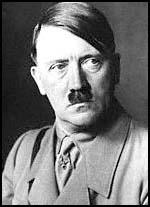
Ilse Braun, the sister of Eva Braun, met Hitler for the first time in 1939. "Hitler came towards me, took my hand, and raised it to his lips. His eyes were sky-blue, intense in their gaze, striking but always fixed, immobile. I was slightly disappointed, for I had imagined a more imposing man, more like the portraits that were displayed everywhere. He was always gesticulating dramatically with his hand. I examined his hands. They were very white, sensitive like those of a musician, not very masculine, but attractive.... There was no dancing. Hitler detested and consequently banned this form of amusement."
In August 1939, a group of concentration camp prisoners were dressed in Polish uniforms, shot and then placed just inside the German border. Hitler claimed that Poland was attempting to invade Germany. On 1st September, 1939, the German Army was ordered into Poland.
Hitler, who wanted a series of localized wars, was surprised when Neville Chamberlain declared war on Germany. Even after it happened he found it difficult to believe that during the first few months of the war he genuinely believed that Britain would still negotiate a peace settlement.
For most of the war Hitler lived underground in a concrete shelter at his headquarters in East Prussia. It was here that Hitler controlled the German war effort. At first he was extremely successful. Employing fast-moving tanks backed up with air support, Germany defeated Poland in four weeks. This victory was followed by the occupation of Norway (four weeks), Netherlands (five days), Belgium (three weeks) and France (six weeks). The German Army was amazed at how quickly they defeated these countries and they became convinced that Hitler was a military genius.
The English Channel meant that these Blitzkrieg tactics could not be continued against Britain. Hitler had great respect for Britain's navy and airforce and feared that his forces would suffer heavy casualties in any invasion attempt. Hitler, who had not seen the sea until he was over forty, lacked confidence when it came to naval warfare. As he told his naval commander-in-chief: "On land I am a hero. At sea I am a coward."
At this stage Hitler still hoped that Britain would change sides or at least accept German domination of Europe. His dreams of a large German empire were based on the empire created by the British during the nineteenth century. Although Hitler was often guilty of extreme arrogance he lacked confidence and tended to hesitate when dealing with Britain.
In 1940 Walter Hewell was given responsibility for liaison between Joachim von Ribbentrop, the head of the Ministry of Foreign Affairs and Hitler. On one occasion Hitler described Hewell as an "excellent diplomat... one has to be to become an intermediary between Hitler and Ribbentrop". Traudl Junge, the author of To The Last Hour: Hitler's Last Secretary (2002) points out that Hewell was a popular member of Hitler's inner-circle: "Walther Hewel, the liaison officer from the Foreign Office, was a favourite butt. Hewel was still relatively young for his high rank, and unmarried. He was about forty years old. His pleasing charm, typical of a Rhinelander, made him popular. He had lived in India for years and had many amusing tales to tell of his time there. Hitler asked him, 'So when are you finally going to write your book From Machete to Diplomatic Dagger? But then you're no diplomat! More of a giant diplomatic cowboy!' The tall, dignified Hewel responded to this sally only with hearty laughter. 'If I weren't a diplomat I couldn't stand between you and Ribbentrop, my Fuhrer,' he replied. Hitler had to acknowledge the truth of this, for he knew what a difficult character the Foreign Minister was. But the fact that Hewel was still unmarried made him the object of daily teasing."
Albert Speer claims that Hitler was very close to Hewel: "Hitler also took delight in having Ambassador Hewel, Ribbentrop's liaison man, transmit the content. of telephone conversations with the Foreign Minister. He would even coach Hewel in ways to disconcert or confuse his superior. Sometimes he stood right beside Hewel, who would hold his hand over the mouthpiece of the telephone and repeat what Ribbentrop was saying, while Hitler whispered what to answer. Usually these were sarcastic remarks intended to fan the nervous Foreign Minister's suspicions that unauthorized persons might be influencing Hitler on questions of foreign policy, thus infringing on his domain."
Immediately after the defeat of France in June 1940, Adolf Hitler ordered his generals to organize the invasion of Britain. The invasion plan was given the code name Operation Sealion. The objective was to land 160,000 German soldiers along a forty-mile coastal stretch of south-east England.
Within a few weeks the Germans had assembled a large armada of vessels, including 2,000 barges in German, Belgian and French harbours. However, Hitler's generals were very worried about the damage that the Royal Air Force could inflict on the German Army during the invasion. Hitler therefore agreed to their request that the invasion should be postponed until the British airforce had been destroyed.
On the 12th August the German airforce began its mass bomber attacks on British radar stations, aircraft factories and fighter airfields. During these raids radar stations and airfields were badly damaged and twenty-two RAF planes were destroyed. This attack was followed by daily raids on Britain. This was the beginning of what became known as the Battle of Britain.
Although plans for an invasion of Britain were drawn up Hitler was never very enthusiastic about them and they were eventually abandoned on October 12, 1940. Instead, Hitler attempted to batter Britain into submission by organising a sustained night-bombing campaign.
Frustrated by his lack of immediate success over Britain. Hitler began to concentrate his attentions on Eastern Europe. After taking over Poland, Germany now shared a frontier with the Soviet Union. In Mein Kampf and in numerous speeches Hitler claimed that the German population needed more living space. Hitler's Lebensraum policy was mainly directed at the Soviet Union. He was especially interested in the Ukraine where he planned to develop a German colony. The system would be based on the British occupation of India: "What India was for England the territories of Russia will be for us... The German colonists ought to live on handsome, spacious farms. The German services will be lodged in marvellous buildings, the governors in palaces... The Germans - this is essential - will have to constitute amongst themselves a closed society, like a fortress. The least of our stable-lads will be superior to any native."
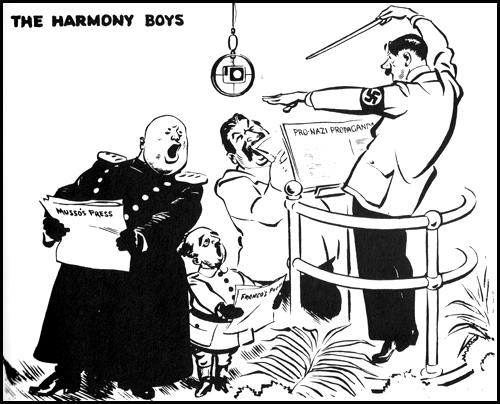
Hitler intended to force Norwegians, Swedes and Danes to move to these territories in the East. Hitler believed that the Blitzkrieg tactics employed against the other European countries could not be used as successfully against the Soviet Union. He conceded that due to its enormous size, the Soviet Union would take longer than other countries to occupy.
During the Second World War Hitler became very dependent on his two valets, Hans Junge and Heinz Linge. Hitler's secretary, Traudl Junge, pointed out: "To say valet doesn't really cover it - the post was more like that of household manager, travelling companion, butler and maid-of-all-work combined. The valet on duty had to wake Hitler in the morning, that is to say knock at his bedroom door, announce the precise time, and give him the morning news. He also had to decide on the menu for the day, fix mealtimes, pass instructions on to the kitchen, and serve the Führer when he ate. He was in charge of a whole staff of orderlies who looked after Hitler's wardrobe and had to clean the rooms and run the establishment, and he made appointments with the dentist and barber and supervised the care of the dog."
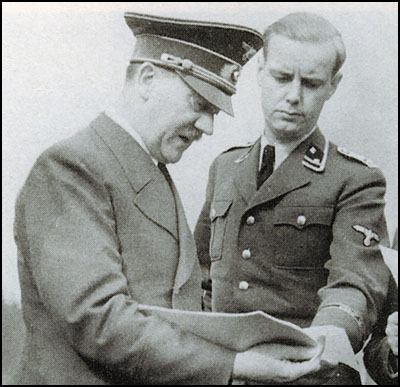
Stalin's response to France's defeat in the summer of 1940 was to send Vyacheslav Molotov to Berlin for discussions. Molotov was instructed to draw out these talks for as long as possible. Stalin knew that if Adolf Hitler did not attack the Soviet Union in the summer of 1941 he would have to wait until 1942. No one, not even someone as rash as Hitler, would invade the Soviet Union in the winter, he argued.
Germany was now in a strong negotiating position and found it impossible to agree to Hitler's demands. As soon as talks broke-up, Hitler ordered his military leaders to prepare for Operation Barbarossa. The plan was for the invasion of the Soviet Union to start on the 15th May, 1941. Hitler believed that this would give the German Army enough time to take control of the country before the harsh Soviet winter set in.
Hitler's plan was to attack the Soviet Union in three main army groups: in the north towards Leningrad, in the centre towards Moscow and in the south towards Kiev. The German High Command argued that the attack should concentrate on Moscow, the Soviet Union's main communication centre. Hitler rejected the suggestion and was confident that the German army could achieve all three objectives before the arrival of winter.
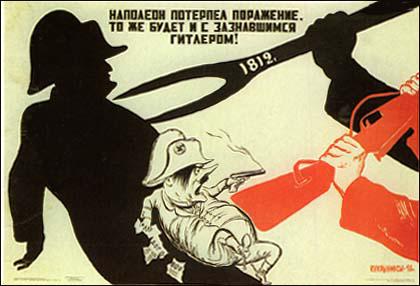
There was also disagreement about Hitler's plans for the territory captured in the Soviet Union. Himmler's SS rather than the army was to take control. The SS were instructed to wipe out all aspects of communism in the Soviet Union. Communist officials should be executed and, as the Russians were 'sub-human', ordinary conventions of behaviour towards captured soldiers did not apply. It is estimated that during the first year of invasion, over a million communists were executed by the SS. Senior officers objected on tactical as well as humanitarian grounds. They argued that knowledge that they faced death or torture would encourage the Soviets to carry on fighting instead of surrendering.
Hitler, as always, was unwilling to listen to opposing arguments. If his advisers persisted in disagreeing with him they were dismissed. Of the seventeen field-marshals only one managed to keep his post throughout the war. Thirty-six colonel-generals were also involved in advising Hitler during the Second World War. Of these, twenty-six were sacked or executed. As seven were killed in action, only three managed to hold on to their positions during the war.
Hitler's unwillingness to listen to information that might lead him to change his desired goals constantly caused him problems during the war. This was especially true of his attack on the Soviet Union, when he ignored warnings concerning winter weather and poor road conditions. Instead he relied on information that suggested that the morale in the Red Army was extremely low and that they would rather surrender than be involved in a long drawn-out struggle with Germany. Hitler was so confident of early success that the German Army was sent into the Soviet Union with equipment for only a summer campaign.
At first the German forces made good progress and important cities such as Riga and Kiev were taken. However, the heavy rains in October interfered with the speed and efficiency of Germany's tanks. This was followed by heavy snow in November and December that brought Germany's advance to a halt. Hitler refused to accept his mistake and ignored suggestions that the German army should make a tactical withdrawal.
After taking over Poland Hitler had another three and a half million Jews under his control. For a time there was talk of deporting all Jews to Madagascar or keeping them confined to a small area in Poland. The number of Jews under Hitler's control grew as German forces advanced deeper into the Soviet Union. Over two million Jews lived in the Soviet Union and most of them lived in the areas under German occupation. It was while the SS were rounding up the Jews in the Soviet Union that Hitler decided on what became known as the Final Solution.
In 1942, Joseph Goebbels wrote in his diary about Hitler's plans: "The Fuehrer... expressed his determination to clean up the Jews in Europe... Not much will remain of the Jews. About sixty per cent of them will have to be liquidated; only about forty per cent can be used for forced labour." Special units from the SS were set up under the control of Heinrich Himmler to carry out this extermination programme. At first the victims were shot but, with a high proportion of those involved in the killings suffering from nervous breakdowns a more impersonal method was developed.
By the beginning of 1942 over 500,000 Jews in Poland and Russia had been killed by the Schutz Staffeinel (SS). At the Wannsee Conference held in January 1942, Reinhard Heydrich chaired a meeting to consider what to do with the large number of Jews in Germany's concentration camps. Also at the meeting were Heinrich Muller, Adolf Eichmann and Roland Friesler.
Those at the meeting eventually decided on what became known as the Final Solution. From that date the extermination of the Jews became a systematically organized operation. After this date extermination camps were established in the east that had the capacity to kill large numbers including Belzec (15,000 a day), Sobibor (20,000), Treblinka (25,000) and Majdanek (25,000).
It was decided to make the extermination of the Jews a systematically organized operation. After this date extermination camps were established in the east that had the capacity to kill large numbers including Belzec (15,000 a day), Sobibor (20,000), Treblinka (25,000) and Majdanek (25,000). It has been estimated that between 1942 and 1945 around 18 million were sent to extermination camps. Of these, historians have estimated that between five and eleven million were killed.
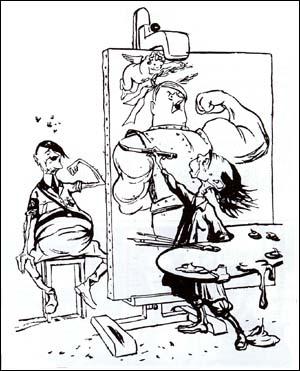
Except for the execution of Ernst Roehm, Hitler never showed any signs of remorse when people died because of his actions. It was reported that Hitler used to laugh when Joseph Goebbels described the sufferings of the Jews. Hitler also showed little concern over the numbers of Germans who died. Late in the war, when all chance of victory had disappeared, he gave orders that resulted in thousands of German soldiers being unnecessarily killed. When commanders refused to carry out these orders he had them executed. Hitler never showed any signs of regret for these actions. He once remarked that a guilty conscience was a Jewish invention.
At the start of the Second World War, President Franklin D. Roosevelt announced the intention of the United States to remain neutral. Roosevelt was personally hostile to Hitler's Nazi dictatorship but he was aware that the American people had no desire to become involved in the war. However, Roosevelt did arrange for Britain to receive supplies and loans that enabled her to continue fighting the war.
Hitler believed that he would eventually be forced to fight the United States but he wanted to make sure that he controlled Europe before that happened. He gave strict instructions that German submarines should avoid firing on ships that were likely to be carrying American passengers. He also attempted to persuade his Japanese allies to attack the Soviet Union and to leave the United States alone. They ignored Hitler's advice and on December 7, 1941, the Japanese Air Force attacked Pearl Harbor and declared war on the United States.
Hitler, who had not been told of Japanese plans, was furious at first that the United States had been dragged into the war. Hitler, who had previously called the Japanese "honorary Aryans" claimed that this is what happens what your allies are not Anglo-Saxons.
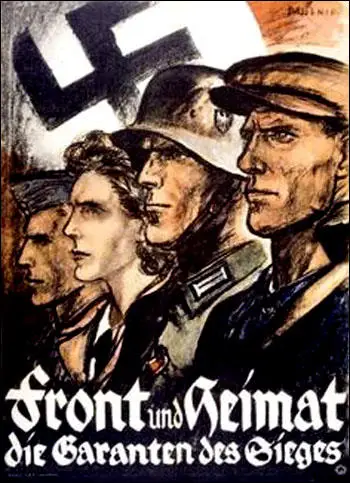
President Franklin D. Roosevelt declared war on Japan but did not mention Germany in his speech. It was still possible for Hitler to postpone the war with the United States but he decided to honour his treaty obligations with Japan, and on December 11 announced that Germany was at war with the United States. Once again he became a victim of his own prejudice. Hitler claimed that America had been "corrupted by Jewish and African blood" and would be no match for Aryans.
In the second campaign on the Soviet Union Hitler concentrated his attack on Stalingrad. During the winter of 1941-42 the Soviets had reorganised their defences and were able to halt the German advances. In the autumn of 1942 they counter-attacked and by November the German Sixth Army was surrounded. The German Army commander in the Soviet Union, Freidrich Paulus, asked permission to break out, but Hitler, refusing to believe the Soviets could beat Germany in battle, told Paulus to stand and fight. On February 2, 1943, Paulus and the Sixth Army were forced to surrender. Out of the 265,000 men, 100,000 had been killed, 34,000 wounded and 90,000 taken prisoner.
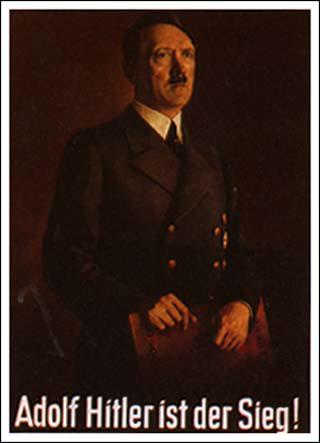
Once again Hitler refused to accept responsibility and failed to learn from the defeat. He blamed Hermann Goering and the Luftwaffe for not providing the Sixth Army with the necessary support. He also claimed that he was travelling by train during an important stage of the battle and was therefore not in a position to direct operations which would have enabled the Sixth Army to defeat the Soviet forces.
The German defeat at Stalingrad was the turning point in the war. The Soviet army now began to advance from the East. For the rest of the war Germany was on the retreat. Hitler had always found it difficult to cope with set-backs. He refused to believe he was guilty of mistakes and instead accused those around him of betrayal. Hitler began to suffer from depression and his insomnia became worse.
Primary Sources
Student Activities
Adolf Hitler's Early Life (Answer Commentary)
British Newspapers and Adolf Hitler (Answer Commentary)
An Assessment of the Nazi-Soviet Pact (Answer Commentary)
Lord Rothermere, Daily Mail and Adolf Hitler (Answer Commentary)
Heinrich Himmler and the SS (Answer Commentary)
Adolf Hitler's Early Life (Answer Commentary)
Adolf Hitler v John Heartfield (Answer Commentary)
The Hitler Youth (Answer Commentary)
German League of Girls (Answer Commentary)
Night of the Long Knives (Answer Commentary)
The Political Development of Sophie Scholl (Answer Commentary)
The White Rose Anti-Nazi Group (Answer Commentary)
Kristallnacht (Answer Commentary)
Trade Unions in Nazi Germany (Answer Commentary)
Hitler's Volkswagen (The People's Car) (Answer Commentary)
Women in Nazi Germany (Answer Commentary)
The Assassination of Reinhard Heydrich (Answer Commentary)
The Last Days of Adolf Hitler (Answer Commentary)
